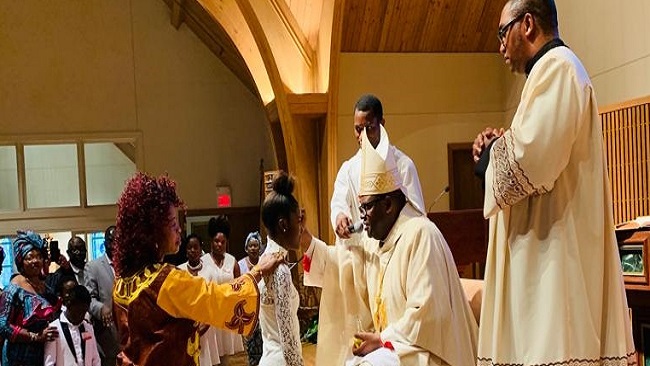Roman Catholicism: Africa is a rising force, but Rome has yet to catch up
As Pope Francis celebrated Mass on Sunday he looked out on a congregation of up to a million people. Many of them had slept overnight on the red soil of a field on the outskirts of Antananarivo, the capital of Madagascar. They had braved the chill of the Southern Hemisphere’s winter for a chance to attend the papal Mass. As the wind whipped up rust-coloured clouds of dust, the Pope acknowledged the sacrifices of those who had camped out the night before. “As we look around us, how many men and women, young people and children are suffering and in utter need?” he asked. “This is not part of God’s plan.”
Madagascar is indeed a suffering nation. The island, located some 250 miles off the coast of East Africa, is one of the world’s poorest countries. Three quarters of its population of 26 million live on less than $2 a day. The message that Francis brought was that poverty was not inevitable. He was not, however, preaching the so-called Prosperity Gospel, which has made deep inroads in Africa with its promises of health and wealth in return for tithes. No, he argued rather that faith can nourish hope, which can in turn inspire people to build enterprises which lift themselves and others out of poverty.
Madagascar was the second stop on Francis’s fourth visit to Africa. His journey began in Mozambique and ended in Mauritius. This tour of the “3Ms” underlined Africa’s increasing prominence in the global Catholic Church. It is important to grasp just how much the Church has grown in Africa over the past century. In 1900, there were just two million Catholics. In 2000, there were 140 million. Today, Africans account for roughly 15 per cent of Catholics worldwide.
Rome however, has been slow to respond to this astonishing growth. It was not until 1969 that a modern pope visited the continent, when Paul VI made a three-day trip to Uganda. St John Paul II sought to make up for lost time, visiting Africa 16 times during his 27-year pontificate. But to this day there are conspicuously few Africans in senior leadership positions in the global Church. In percentage terms, Africans are under-represented in the College of Cardinals – though Francis seems to be doing his best to rectify that. There are just two prominent Africans in top posts in the Roman Curia: Cardinal Peter Turkson, prefect of the Dicastery for the Promotion of Integral Human Development; and Cardinal Robert Sarah, prefect of the Congregation for Divine Worship. Yet Cardinal Sarah’s influence has been curtailed by the appointment to the Congregation of those with little sympathy for his liturgical vision.
There is, therefore, a considerable way to go before African Catholics take their rightful place in the worldwide Church. But there can be little doubt that the continent’s bishops are in the ascendancy. The Catholic commentator John Allen identified the family synod of 2014 as a turning point. He argued that the progressive agenda advanced by the German contingent “met stiff resistance from several African bishops, who no longer regard themselves as junior partners in Catholicism Inc”. When the Pope picked six prelates to oversee the synod’s final document, Africans complained that no one from their continent had been chosen. So the Pope added the South African Cardinal Wilfrid Napier.
Since the Second Vatican Council, Western media have analysed Catholic issues in terms of a clash between “liberals” and “conservatives”. This crude classification is still dominant today. African bishops are therefore invariably described as “conservative”. But it is wrong to think that they all fit neatly into this bracket. At the family synod of 2015, for example, the Ghanaian Archbishop Charles Palmer-Buckle reportedly expressed support for Communion for remarried Catholics. When it comes to the economy, most African bishops take positions that are hardly conservative. Still, this simplistic categorisation is likely to persist.
Western Catholics will become ever more familiar with the African Church in decades to come. African clergy are already a common sight in parishes in Britain and France. Their presence is not limited to the former colonial powers: a recent article at qz.com argued that they are “the future of the Catholic Church in the United States”. To cap it all, at some point over the coming decades we may well see an African pope.
Source: The Catholic Herald





